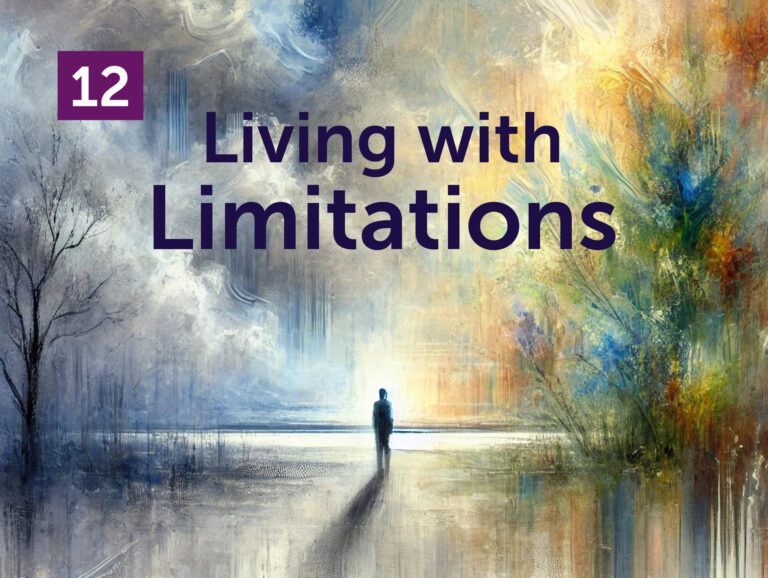Charlotte
It wasn’t till I moved up to Leeds where I met a community of others who understood chronic illness – I now have a bunch of friends who also have chronic illnesses and disabilities – that I started to think about what it meant, and also to begin using the language of disability. Until then I’d been robbed of the language of disability because that indicated failure.
I saw using the language of disability to describe my illness meant something negative. I now see this attitude as internalised ableism. It meant admitting that I wasn’t strong enough, meant I wasn’t an overcomer. You know, if I’m not being super positive about it, then I’m failing. And so I didn’t deal with it. I didn’t talk about it. I didn’t think about it. Because the only option (given to me theologically) was to be an overcomer. And so all of the struggles I was having with my identity, the things I was losing to the illness – not being able to work as hard as I wanted to, not being able to do as much stuff – meant I felt like that was a personal failure. Spiritually, that’s very difficult. That was a very difficult journey.
Now it’s OK because it’s fuelled by, if we’re being real, sometimes spite more than overcoming.
Craig
I can certainly relate to your comments on overcoming. Goodness, the number of times I was given that word – and I think it’s much more to do with the needs of the person who brings it.
Charlotte
Yeah.
Craig
Not all problems or challenges can be ‘solved’, and they don’t all need to be.
Charlotte
Absolutely. Yes.
Craig
So what have you learned about about disability, and attitude to disability, by reading the text alongside your personal experience?
Charlotte
I would say the first thing is that disability is a fluctuating category across time. What was disabling in the 1st century is not what’s disabling now and vice versa. There’s a really great scholar called Candida Moss who points out that phenomena like seizures or epilepsy were often considered good things in the 1st century because they were believed to be holy or spiritual occurrences in, say, Greco-Roman religion because you are connecting to the gods – these are people being taken out of themselves into a different space, into a spiritual space, and they’re connecting with the gods. And so often people like that were afforded special honour, or given places in temples. People consulted them because it was thought they had this special spiritual connection. So it was not disabling in the way that now, using a medical model, we would say the seizures are the result of epilepsy and are a very specific illness. We know what epilepsy is, we know what it does, how it affects the brain, how it disables people medically. But a social model of disability is to do with how someone interacts with the world. So, in the 1st century it’s to do with spirituality and religion as much as it is to do with your physical illness and that changes how someone is either celebrated or disabled.
So I think, for me, when I read passages on disability I’m interested in a couple of things: What’s going on? What’s the religious position of this person? (Because quite often their religious position is towards Jesus and they represent something specific in the text. Our gospels aren’t just a document of all the things Jesus did – these are stories that are picked by our gospel writers specifically in order to tell us something.)
So there’s a religious positioning, and I’m also interested in the social positioning of the person because quite often what happens is both a physical healing and a social healing.
And we have often missed that: We’ve read our Bible through a very medical lens and we forget that we’re modern people who think ‘isn’t it amazing that this person was healed? Jesus must be really into healing and he must be into people having “whole bodies”’ (bodies that are perfect in a medical sense that don’t have any deficits. I’m trying to pick my language really carefully, but the language of disability is never easy, is it?)
But actually what’s happening quite often in New Testament texts, is something social as well. There is no separation of health, social position and religious position.
So there’s the man who Jesus heals and then tells him to go to the temple and show himself to a priest. Well, when he does that, the text is acknowledging that there is a social aspect to disability as much as a physical one. It’s not enough for this man to just to be healed. It’s not just about that physical healing, because for him to be accepted back into the community there needs to be a social acknowledgment that this person is “whole” again, or “clean” again, or ritually “pure”. (I’m using inverted commas here because the language of disability is complex and these terms have a moral value to which I do not subscribe but are used in the texts and discussions we are talking about). Whatever the issue is, to me its really interesting this occurs in these texts because in disability campaigning we’re having to make clear that there is social element to disability: It’s not just about our bodies, it’s about these things. And here we see it in the ancient world. We can see that social element in those texts really quite strongly.
to be continued…
Do you have any comments or questions? You can contact us here: hello@northumbrian.org


